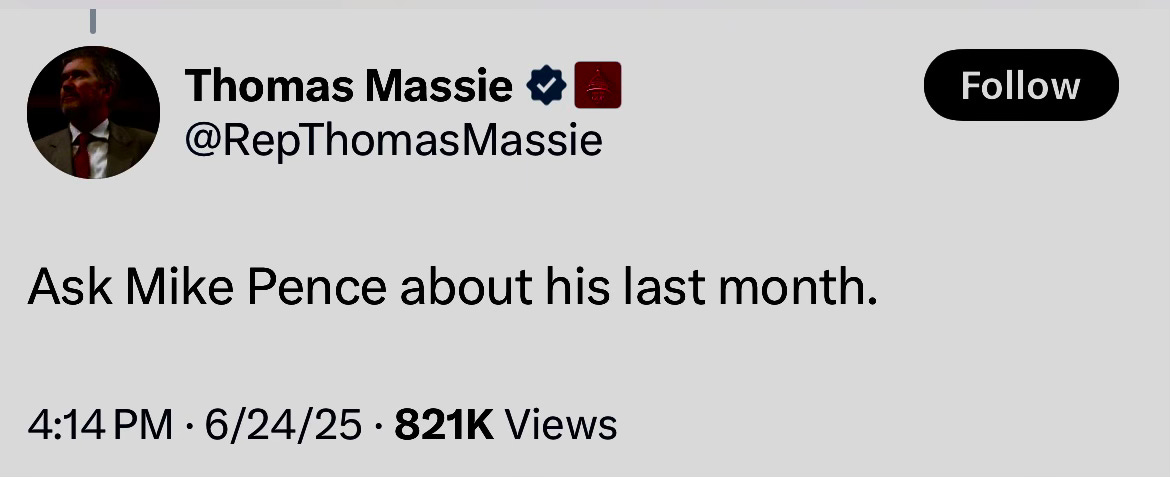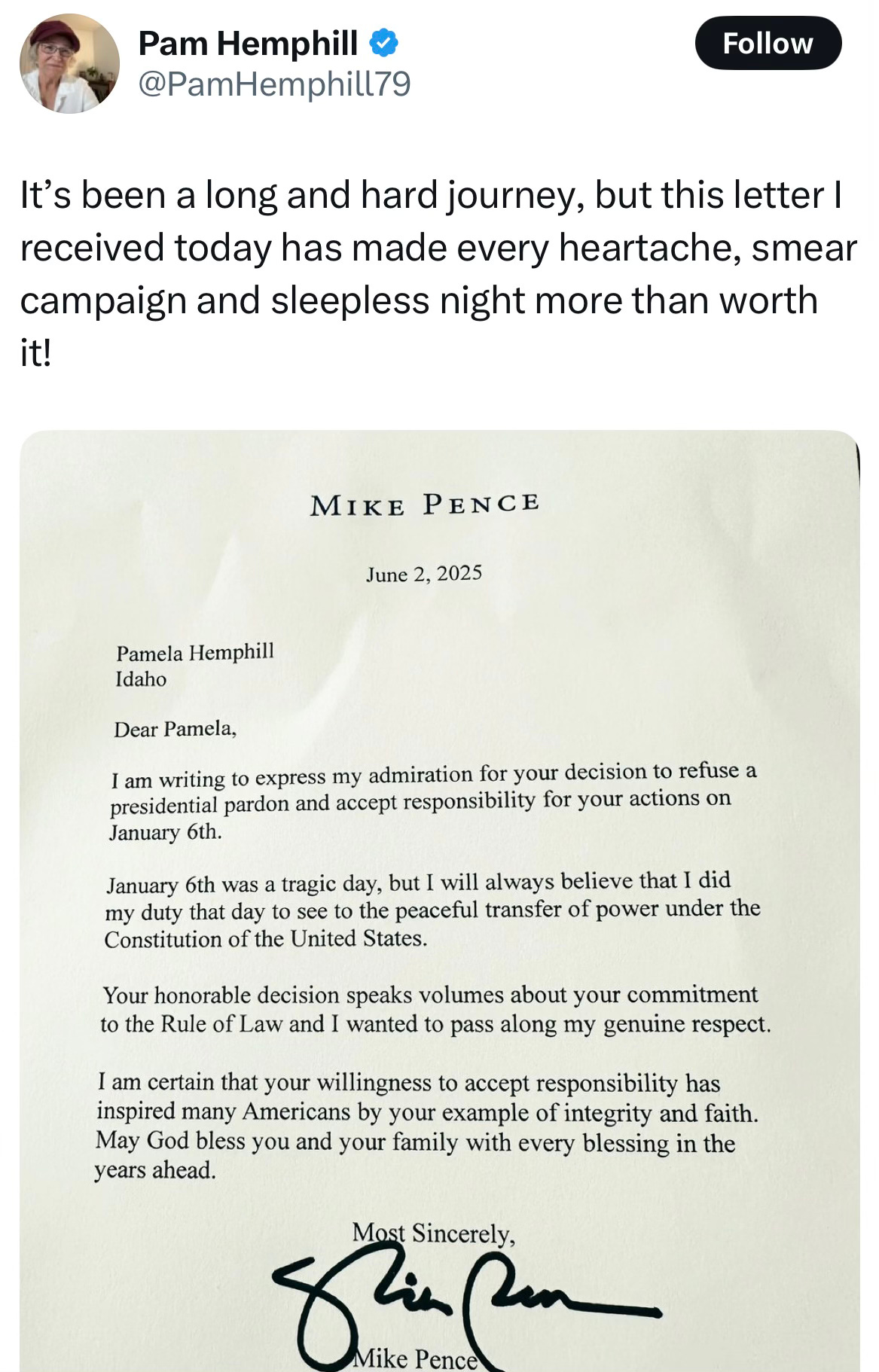A Nation’s Self-Conception, &c.
On American purposes, a renegade Republican, names from Ghana, a composer’s immortality, and more

For Christianity Today, Andy Olsen has written a piece that is very disturbing. (At least I find it so.) It is also something to be digested and pondered. It prompts the question, “What is America for? What are our purposes? Who are we?”
The article is headed, “ICE Goes After Church Leaders and Christians Fleeing Persecution.” The subheading reads, “On Tuesday, Iranian asylum-seekers were detained in Los Angeles, adding to the count of church members taken despite lawful status.” Accompanying the article are pictures that also tell the tale.
I will quote one paragraph:
The detentions add to a growing number of church members and Christians seeking religious protection who get picked up by ICE. Often they have no apparent criminal history. In many instances, they were in the United States lawfully, complying with orders from immigration courts. ICE has traditionally not deported individuals with pending asylum petitions, who are allowed to work while their cases proceed.
No country, even the best, can help every falling sparrow. But we have long conceived of ourselves as a place of refuge. Many of our political debates have, at their heart, the question, “Who are we?” Also: “What makes us exceptional?”
***
Congressman Tom Massie, the Kentucky Republican, is an unusual cat. Not my cup of tea. But I can appreciate his distinctiveness. This news report is headed, “Trump and his political operation target their first GOP incumbent.” That would be Massie.
What did Massie do wrong (or “wrong”)? The report explains that he “has drawn Trump’s wrath by saying the president lacked the authority to attack Iran’s nuclear sites without congressional approval” and by voting against Trump’s “One Big Beautiful Bill Act.”
That’s the official name, by the way: the “One Big Beautiful Bill Act.” Isn’t that kind of amazing?
Another mark against Massie—or for him, depending on your point of view—is that he can be cheeky online. Here was JD Vance:
And here came Congressman Massie:
Stay on that subject for a minute. This was remarkable, I thought:
Return to the incumbent vice president, Vance, for a moment. He said, “We’re not at war with Iran. We’re at war with Iran’s nuclear program.” I believe I know what he means. The United States has one concern in Iran, for now: the destruction of that nuclear program.
But if an adversary attacked the Pentagon and then said, “We’re not at war with America, we’re just at war with its defense department,” I think most of us would say: “Absurd.”
***
I would like to examine a name, briefly. The leading Democrat in New York’s mayoral race is Zohran Mamdani—whose full name is Zohran Kwame Mamdani. The middle name comes from Kwame Nkrumah, the post-independence leader in Ghana.
You may recall Kwame Kilpatrick, a mayor of Detroit in the 2000s.
“Kwame” is a name given to boys born on Saturday. Nkrumah, interestingly enough, was born on a Tuesday. But Kofi Annan, who served as the U.N. secretary-general, was born on a Friday. “Kofi” is for Friday what “Kwame” is for Saturday.
***
Entertaining a crowd, President Trump said, “Guys like Schumer, our great Palestinian senator. This guy—no, he’s changed. He used to like Jewish people, now he’s totally against Jewish people. It’s the most incredible transformation I think I’ve ever seen.”
Recently, Senator Schumer wrote a book called “Antisemitism in America: A Warning.” If Schumer (who is, of course, Jewish) is “totally against Jewish people”—then Jews can rest easy. They have no adversaries in all the world.
***
Lalo Schifrin, the composer, has passed away at 93. (For an Associated Press article, go here.) I had the pleasure of meeting him some years ago. He wrote a lot more than the Mission Impossible theme. But a handful of notes from that theme are known all over the world. Imagine having written something like that. It’s like having written “Happy Birthday” or something.
Immortality.
***
Bill Moyers has passed away at 91. (For the obit in the New York Times, go here.) There are a thousand things to say about his career, or careers, in politics and media. But let me say one thing: His documentary on “Amazing Grace” is first-rate.
The words to this hymn were written by John Newton, a slave trader turned abolitionist. “Amazing Grace” reaches so many souls.
***
Another obit, also in the Times, is headed “P. Adams Sitney, Leading Scholar of Avant-Garde Film, Dies at 80.” In 2015, Mr. Sitney said, “There’s in the art world in America now a deep hatred of the idea of originality and inspiration, a deep hatred of revelation. There’s some ridiculous notion that art can be democratic. Art is the least democratic of all things!”
Heh.
***
Cynthia Polsky was a friend of mine, and it was a privilege to know her. The Metropolitan Museum of Art ran an obit of her, published here. She was a longtime trustee and benefactor. I wrote about her once in a Salzburg journal—a journal from the Salzburg Festival, in Austria.
I will paste, with your indulgence. I think you will like getting to know her, even now:
Cynthia Polsky is a grand, wonderful, and invaluable lady of New York. She and her husband Leon do any number of things, serving on boards, keeping the arts alive, and so on. Mrs. Polsky herself is an artist. The Polskys have been coming to Salzburg for over 20 years. And Mrs. Polsky has what you might call Salzburg roots.
Her father was Joseph Hazen, a pioneer in the movie business. Working for Warner Bros., he “wrote the contract between the studio and Edison Vitaphone that resulted in ‘The Jazz Singer,’” the first talkie. (I’m quoting from an obit, here.) He later left Warner Bros. to partner with Hal Wallis in what became Wallis-Hazen Productions. Mrs. Polsky’s mother was Lita Annenberg Hazen, daughter of Moses and Sadie, sister of Walter.
Incidentally, Mrs. Polsky’s cousin is Donald Kahn, one of the principal benefactors of the Salzburg Festival. He lives here in Salzburg, as well as in other places.
This year, Mrs. Polsky tells some of us an interesting story—I will relate it briefly, just the outlines. Her mother and father honeymooned in Salzburg: in August 1936. Max Reinhardt, one of the founders of the festival—along with Richard Strauss and Hugo von Hofmannsthal—gave them the use of Schloss Leopoldskron. It was his wedding present to them. The Hazens brought along the Warners, Jack and Ann. A very fine time was had by all: You can tell by the pictures.
Joseph Hazen had been to Salzburg several times before, attending the festival (which began in 1920). For the bride, it was the first trip. She filled up a trunk with dirndls, the Austrian dresses—including little ones.
Cynthia Polsky would grow up in those.
Of course, after 1938 or so . . .
We’ll fast-forward. After the war and Holocaust, Hazen attended the Nuremberg trials, taking pictures, both still and moving. They exist somewhere, in archives.
The Polskys first came to Salzburg in 1989, at the invitation of her cousin Donald. They are an adornment to Salzburg society, during Festspielzeit, festival time.
Needless to say, probably, the relationship between Jews and Salzburg—and Jews and Austria, and Jews and Germany—is complicated.
I learned so much from “Cyn,” as friends called her. We talked frankly about any number of subjects—including money. She grew up with a lot of it and had a lot of it. But she was very sensible about money, even frugal, you might say. Not cheap, heaven knows—she was generous as all get-out. But she was mindful.
People with money tend to husband it, she said. A lot of people have a lot—and lose it.
One day, we were talking about jewelry, for some reason. Probably, I had noticed something on her. She said that her father had told her, “You can buy and wear costume jewelry, you know. Because, on you, everyone would think it was real.”
Googling around, I found a Times article about her wedding to Lee—an article published on April 20, 1957:
Miss Cynthia Jo Hazen and Leon Bernard Polsky were married here yesterday afternoon in the home of the bride’s maternal grandmother, Mrs. Moses L. Annenberg of 2 East Eighty- eighth Street. The ceremony was performed by the Rev. Dr. Nathan A. Perilman of Temple Emanu-El.
The bride is a daughter of Mr. and Mrs. Joseph H. Hazen of 888 Park Avenue. The bridegroom is a son of Mr. and Mrs. Joseph A. Polsky, also of New York.
Mr. Hazen escorted his daughter in marriage. She was attired in a gown of white silk organdy, designed with a fitted bodice and a bouffant skirt appliqued with organdy roses and Alençon lace leaves. Her veil of tulle was attached to a headdress of organdy roses and lace leaves, and she carried a bouquet of phalaenopsis orchids and lilies of the valley.
Mrs. Stanley Zachary Cherry of Beverly Hills, Calif., was matron of honor for her sister. Ned Polsky was his brother’s best man.
Have a fine weekend, my friends, whether it includes orchids and lilies or not.






In my opinion January 6th was Mike Pence’s finest hour. The Constitution and rule of law mattered to him. He was courageous that day. Thanks for posting his letter.
Your reminder about the origin of "Amazing Grace" was timely for me. I was privileged to hear the legendary Judy Collins in concert last. The finale was an audience singalong to that song. At the age of 86, she still has the voice to move an audience.